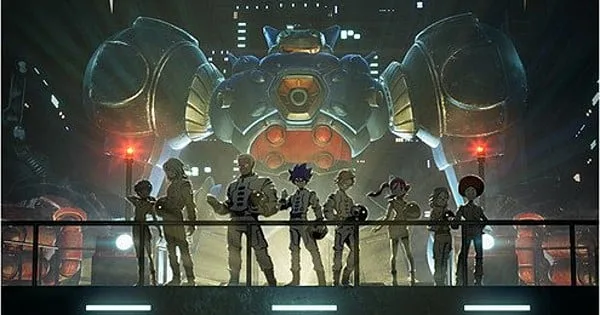Megaton Musashi Season 1 Anime Series Review – Review

The idea that mecha is a “dead genre” of anime is an oft-repeated yet provably wrong fallacy. New seasons regularly bring refreshed entrants in the medium, often flying under the radar compared to whatever irregular Gundam entry was last seen. Perhaps mecha‘s doggedly niche reputation in Western anime spheres contributes to fandom and discussion being less visible among English speakers. That might explain why Megaton Musashi, Level-5 and OLM‘s big original robot series, initially skipped simulcasting back in October of 2021 and only recently wrapped up streaming its first season on Crunchyroll (with the whole second season being unceremoniously dropped immediately after). Or maybe it’s because the anime ostensibly exists as a tie-in to its video game franchise, which only barely got an English-translated release earlier this year.
Whatever the reason for Megaton Musashi‘s delayed landing in the West, any fresh new mecha series ought to be cause for celebration from fans of the genre. Enjoyers of simple, smash robot action might think this would be an easy good time to get into, being a basic-looking gathering of kids driving themed robots, with their video game version even sharing guest-star space with such formative classics as Mazinger Z, Getter Robo, and Voltes V (this has been a hell of a year for Voltes V). Viewers would be forgiven for thinking Megaton Musashi‘s only ambitions were showing up, punching out some bad guys, then punching out for the day. However, as early as the first episode, it becomes clear that writer/director Akihiro Hino had his sights set…higher.
Invoking Hino’s name in this context might raise red flags for some, as while overseeing the wide variety of Level-5’s output, he also took the lead on the story of the much-maligned Gundam AGE. So there might be some trauma in seeing him again head up an ambitious mecha anime. In the context of Megaton Musashi‘s first season, that ambition mainly manifests in the sheer amount of plot points that make up its story of robot-battling high schoolers. It’s not enough to be simply fending off an alien invasion; the conflict that Yamato and pals get roped into involves a comprehensive, The Truman Show-esque artificial city conspiracy, body-possessing-shape-shifting invaders, surprise androids, and, naturally, Newtypes. Roughly every episode of this first season introduces at least one new swerve of a concept that feels akin to how Airplane! delivers jokes—not impressed that one seemingly innocuous schoolgirl turns out to be the leader of a violent street gang? No worries, because coming up after that is a kid who turns out to be a secret robot.
The resultant roller coaster as the show throws plot spaghetti at the wall can be entertaining to watch in the moment. Many of the plot twists are structured effectively, such that they reward audiences who follow what’s being set up. For instance, as soon as the first episode explains that the human resistance group has the technology to erase and implant memories, audience members can start speculating about denser, darker areas to which the concept could go. The series delivers that in places. However, in other aspects, the sheer amount of written stuff often sees elements crowd each other out. A character like Asuna, who’s technically central to the plot but in a way that mechanically facilitates interactions between Yamato and Arshem, gets effectively forgotten about for episodes at a time. One key plot twist late in the series utterly fails to land because the character at the center of its reveal has barely been seen.
All those issues are nothing of some of Megaton Musashi‘s plot points start feeling overcompensating as it crests its first season climax. The series has dark elements to its origin story and underscores some serious subject matter. However, things still feel in line with its teen-focused tone and Takuzō Nagano character designs right at home among Level-5’s Inazuma Eleven and Yōkai Watch. Only towards the end do bodies start hitting the floor, and illicit age-gap interspecies sexual relations are dropped as a late-game surprise. It culminates in a season-ending plot twist that I think is supposed to be a shocking setup. Still, it mostly registers as laughable, alongside all the other undercooked elements that have propelled the adventure thus far.
Admittedly, the first season of Megaton Musashi is very clearly designed as a “Part One” to be followed by its premeditated second season. So, this discord of dramatic dalliances may come together meaningfully by the story’s proper end. But thus far, there’s not much reason to believe so. This series would be a standard alien invasion story at its hollowed-out core without all the psychic powers, androids, and space furries. Less time to focus on each plot-twist concept means less time to marinate on what they might mean in terms of thematics. The anime gestures at advocating for peace in the wake of one species’ desperate colonization of another’s home and the opposing violent fallout. However, the writing isn’t at the level where it can meaningfully analyze the complexities and moral ambiguity that could inform such a setup. It instead has to settle for a basic “war is bad” platitude motivated by a couple of its main moppets deciding they want to smooch each other.
Now, all the disparate ingredients in this underbaked conceptual casserole might not have mattered as much if the main draw, the mecha battles, had been enough to motivate powering through the series. More chaotic, stupider stories have blasted off on the backs of their action before—you’re talking to a Symphogear fan, after all. While Megaton Musashi‘s mix-ups in the mecha aren’t necessarily bad, they are very much just…there. It’s not because they’re wholly CGI generated, as that can work, and the resultant robots move smoothly enough. It is better than the characters’ stiff, chunky traditional animation, anyway. However, due to the nature of the plot, the lion’s share of the robot battles take place in an environment completely removed from the one the characters themselves regularly inhabit. There are few fleeting instances of the pilots doing anything around the mecha except sitting inside them, siloed off from the war zones they’re navigating. It creates a disconnect in the dramatism of the story. The environmental line has at last been breached by the end of the first season, so perhaps this is an oddity made up for in the following season.
Still, the mecha battles never quite hit that consistent level of hype and dynamism viewers might hope could carry this project. There are a handful of over-the-top setpiece moments, but finishing punch lines on perfunctory combat setups. Like so many of the characters unceremoniously being brought into the fold once their defining plot twists are covered, the details of the battles themselves can start to blur together before long. Maybe these instances work better when you play them in a video game.
The raw energy of Megaton Musashi‘s ups and downs means it at least settles into being fine on balance—whatever balance looks like for an anime like this. If you remember hearing about this series a couple of years ago but forgot about it until now, it might still be worth checking out to see how much more is going on in it past its immediate initial impressions. But everything it’s throwing out seems to prioritize quantity over quality, story-wise, leaving a smattering of points that are just a bit too small and too shallow to grab onto for the long term. Megaton Musashi is a curiosity by this point in its story, and a tenuous beginning for a series isn’t a return to form or revitalization for the mecha genre that never actually left.
Source link
#Megaton #Musashi #Season #Anime #Series #Review #Review



